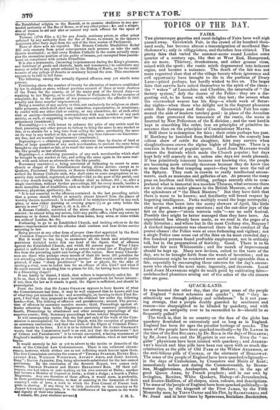TOPICS OF THE DAY.
FAIRS.
THE picturesque gayeties and rural delights of Fairs have well nigh passed away. Greenwich Fair, in the crowd of its hundred thou- sand souls, has become almost a transmigration of moribund Bar- tholomew's; only in villeggiatura, and therefore less vitiated. The pretty fairs that varied the summer-scene round London some quarter of a century ago, like that at West End, Hampstead, are no more. Thievery, drunkenness, and other grosser vices, mixed with the sport ; the rustic mirth degenerated into indecent orgies, and became a nuisance. The death of the fair was not more regretted than that of the village beauty whom ignorance and evil opportunity have brought to die in the purlieus of Drury Lane—pitied perhaps, but hardly wished to live on. The larger fairs that survive have suited themselves to the spirit of the times : the " wakes" of Lancashire and Cheshire, the saturnalia of "the factory system," defy the decree of the Police : they are a dis- gusting evil, to be borne with while they last; the season when the overworked weaver has his fling—a whole week of Satur- day nights—when those who delight not in the flagrant pleasures avert their footsteps and their eyes. Greenwich Fair has sum- moned the aids of modern tutelary genii : in place of the Arcadian gods that protected the innocence of the rustic, the scene is haunted by New Policemen of the K division ; and the vast herd is kept in something like order, less on principles of primitive in- nocence than on the principles of Commissioner MAYNE.
Still there is redemption for fairs ; their crisis perhaps has past. If Bartlemy be banished from Smithfield before the scarcely less odious show of cattle for slaughter, fairs may survive when slaughterhouses crown the alpine bights of Islington. There is a reaction in favour of popular sports. Lord Joint MAN-Nuns would restore the festivals which made the Church popular ; but days kept holy will scarcely do so' unless also days are made pleasant. If less primitively innocent because not knowing vice, the people are becoming more critically decorous because they do know vice in more than its first tempting aspect—they have seen the tail of the Sphynx. They rush in crowds to really intellectual amuse- ments, such as museums and galleries of art. At present the many pass on heedless and little witting, perhaps scarcely able to com- prehend what is immortal in a noseless Theseus what sermons there are in the stones under glasses in the British Museum, or what are the splendours of "the Black Masters." But they have faith that there is more to be known ; and familiarity will breed respect by begetting intelligence. Parks multiply round the huge metropolis ; the leaves that burst into the sunny showers of April, like little stars of green, awaken gay emotions ; and the out-door joys of the fair on the grass—"niveis tentoria veils "—are no unfit festival. Possibly they might be better managed than they have been. An experiment has already been made, as we read in the pages of a daily historian ; and where but in the most Cockney site Stepney ! A marked improvement was observed there in the conduct of the poorer classes : the Police were at once forbearing and vigilant ; not a single Police case arose out of the fairs on its most crowded day ; five hundred persons found profitable employment, not in ordinary toil, but in the preparatives of festivity. Good. There is to be another fair next Whitsuntide ; and the march of improvement should be kept up. Many new devices, suited to the taste of the day, are to be brought forth from the womb of invention ; and no entertainment might be rendered more useful and agreeable than a fair, especially by encouraging those caterers for the day's amuse- ment who showed the most taste, ingenuity, and decorum. Local Lord Joint MANNERSES might do much good by cultivating fairs- undebauched phcenixes arising out of the ashes of the old sinners that are gone.


























 Previous page
Previous page